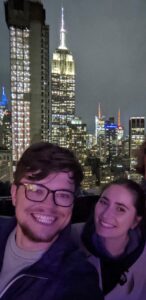Robert Richer at the New York University (NYU) Grossman School of Medicine
In September 2023, I had the opportunity to visit the Computational Psychiatry group at New York University (NYU) Grossman School of Medicine, led by Prof. Katharina Schultebraucks. I met Katharina at a conference in March 2022. After hearing about her research, we found that it is very closely aligned with the research of EmpkinS and decided to initiate a collaboration between EmpkinS and NYU. The first step was Katharina’s visit to Erlangen in June 2023. Afterwards, I was invited to visit her in New York as part of my EmpkinS research stay aboard to get to know her group and her research in more depth.
 The Computational Psychiatry group at NYU is located in a building at quite a famous address: One Park Avenue in the center of Manhattan. It is in close distance to Manhattan’s most famous sights can be seen, such as the Empire State Building, the Chrysler Building, or the Grand Central Terminal. The group consists of researchers and research coordinators of different backgrounds (psychology, medicine, data science, etc.). The research of the group is focused on investigating longitudinal and prospective studies to identify complex sets of early predictors by applying advanced computational and machine learning methods to improve individualized risk stratification and individualized treatment allocation. Thereby, they use high-dimensional longitudinal data, which includes cognitive, emotional, and biological data. They combine this information with “digital biomarkers” that can be assessed in a contactless way during real-world settings, such as facial expressions, speech, and voice.
The Computational Psychiatry group at NYU is located in a building at quite a famous address: One Park Avenue in the center of Manhattan. It is in close distance to Manhattan’s most famous sights can be seen, such as the Empire State Building, the Chrysler Building, or the Grand Central Terminal. The group consists of researchers and research coordinators of different backgrounds (psychology, medicine, data science, etc.). The research of the group is focused on investigating longitudinal and prospective studies to identify complex sets of early predictors by applying advanced computational and machine learning methods to improve individualized risk stratification and individualized treatment allocation. Thereby, they use high-dimensional longitudinal data, which includes cognitive, emotional, and biological data. They combine this information with “digital biomarkers” that can be assessed in a contactless way during real-world settings, such as facial expressions, speech, and voice.
 During my research stay, I participated in their weekly group and project meetings. In addition, I also gave a talk about my own research and the research of EmpkinS in general. It was very interesting to see how these disciplines work together and how they collect and deal with real-world data in challenging environments, such as the emergency departments of hospitals all over New York City. Furthermore, I had regular meetings with Katharina and Victoria, one of my master’s students who is currently writing her thesis in Katharina’s lab. Together with Victoria, I explored whether we could include further digital biomarkers into the pipeline of Katharina’s lab, especially the macroscopic movement parameters we are using in our EmpkinS research.
During my research stay, I participated in their weekly group and project meetings. In addition, I also gave a talk about my own research and the research of EmpkinS in general. It was very interesting to see how these disciplines work together and how they collect and deal with real-world data in challenging environments, such as the emergency departments of hospitals all over New York City. Furthermore, I had regular meetings with Katharina and Victoria, one of my master’s students who is currently writing her thesis in Katharina’s lab. Together with Victoria, I explored whether we could include further digital biomarkers into the pipeline of Katharina’s lab, especially the macroscopic movement parameters we are using in our EmpkinS research.
Even though three weeks is not a long time, I could still learn a lot from my stay, and I hope to be able to keep in touch with the people that I got to meet there, and will afterwards start as a data scientist, so I hope, our collaboration will be further deepened in the future.